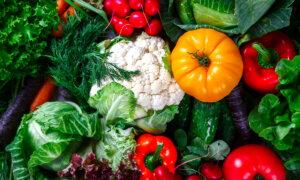Other than feeling a bit squeamish that nasty disease-causing bacteria can lurk in our produce and cause food poisoning, most of us probably haven’t given much thought to the community of microbes living on our fruit and vegetables.
The study proves that plant microorganisms from fruits and vegetables contribute to the human microbiome. While researchers previously knew of the association between a diet rich in diverse fruits and vegetables and a diverse microbial community, this new research shows they are a direct source of gut microbiota.
Fiber-rich plants—which are largely indigestible—have mostly been classified as food for the bacteria living in the human gut. In other words, plants had been considered as only prebiotics and fermented foods as probiotics. Both are necessary for a thriving microbial community.
“The proof that microorganisms from fruits and vegetables can colonize the human gut has now been established for the first time,” the study’s lead author, Wisnu Adi Wicaksono, said in a statement.
Plants as Prebiotics and Probiotics
Essentially, the new study, which is a meta-analysis of a selection of studies and data sets, shows that plants actually play these two vital roles related to the gut microbiome.“These plant-associated bacteria have been previously isolated from the human gut and linked to human health due to their roles as probiotics and pathogens,” the study authors wrote. “Here, we provided evidence that fresh produce-derived bacteria can be detected in the human gut and are a component of the human gut microbiota.”
Unique Study Findings
The microbiome—the total collection of mostly symbiotic bacteria, viruses, fungi, and other microorganisms that live in and on our bodies—helps the body gobble up food and turn it into metabolites. This fermentation process creates short-chain fatty acids that have a plethora of health benefits.Researchers from the Institute of Environmental Biotechnology at Graz University of Technology in Austria analyzed data to demonstrate that the frequency of fruit and vegetable consumption and the variety of plants consumed influences the amount of fruit- and vegetable-associated bacteria in the human gut.
- Early childhood, when the microbiome is being shaped, is a window of opportunity for enhancing the microbiome with plant-associated bacteria. The study affirmed earlier findings that early childhood is when the microbiome is most pliable and dynamic.
- Eating a more diverse selection of fruits and vegetables was directly correlated to a more diverse microbiome, but more frequent consumption of fruit didn’t affect the gut microbiota. Vegetable frequency, however, did increase the richness of microbes.
- Every fruit and vegetable has a unique microbiome.
- Fruit- and vegetable-associated bacteria contributed to an average of 2.2 percent of the overall bacterial diversity in the human gut.
The study suggests that eating more vegetables and fruit early in life can strengthen a child’s immune system. Then—and over time—the diversity of gut bacteria helps the child establish health and resilience against illness.
Connecting Soil to Food to Gut
Soil microbial diversity is a reservoir of the plant microbiome, according to the study, making agricultural practices of particular interest for preserving plant microbial communities.Naturally occurring ecosystems, rather than intensely managed agricultural soils, are more strongly associated with diverse microbial communities in soil. Another concern is whether food cultivated hydroponically and aeroponically would be able to offer equivalent benefits for human health.
A potential solution to these challenges is the addition of probiotics to soil or plants that eventually make it downstream to the human gut. The importance of the plant microbiome could play a role in how the human microbiome is shaped and could be factored into food production, soil, fertilizer, pesticides, and even personalized diets.
“Agriculture or processing companies already have a major influence here. And the storage and processing of food must also be critically reconsidered,” Ms. Berg said.


